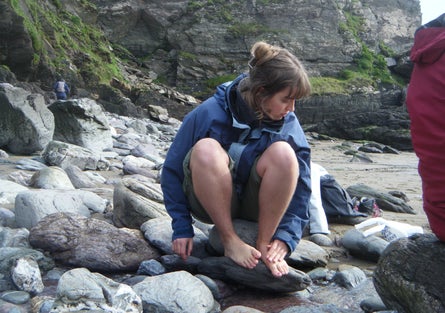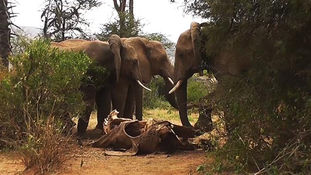If I were to introduce myself, I would say that my name is Rachael Whitfield and I am a Fine Art BA Hons Graduate of Loughborough University with a particular affinity to finding ways to blur the lines between the human and the other-than-human. I love spending time outside, playing violin, sewing, knitting among other crafting and feeling a sense of connection to the people and landscapes around and before me.
Through my art education, I have found a distinct difference in the tone of literature written about our natural world from a creative and scientific perspective. I feel that although recent years have seen a better appreciation for understanding our place in the natural world (and vice versa), there still seems to be some dissonance in terms of othering the non-human and reinforcing the distinct border between 'us' and the natural world. The contemplative nature of the art world and its literature brings an extra level of 'bigger picturing'- context and meaning that situates and ties together information [often in somewhat loose and questionable ways], creating important and potent works that speak to people on a deeper level.

Image 1: Rock spotting in Tregantal, Torpoint. Photo credits to P. Harris

Image 2: A group of African elephants mourning the death of one of their elders. Image sourced from National Geographic article published 2016
An example of the othering of science was listening to The Infinite Monkey Cage [1] earlier in the week, someone brought a question of 'do animals grieve?'. The scientist came to the conclusion that although animals can recognise that they have lost a good thing, they do not have the ability to comprehend the death of another being. To me, this was offensively diminishing of other species. Dogs who have been known to wait by their owner's grave after death; elephants who revisit and tend to the bones or gravesites of their deceased family members and ancestors; monkeys and crows who hold ceremonies if one of their group passes; even systems of trees can feel and react when one of their fellows die. If our own species have had their distinct ways of grieving and burying our dead since before we were a society, why can't the same feelings be allowed for other beings?
To introduce my blog, I would say that through reviewing and evaluating the different medias and literatures surrounding the natural world and the experiences I gather from my work in conservation, I aim to bridge the gap between scientific knowledge and the connective, meaningful nature of the art world. My posts hope to be fascinatingly informative yet philosophically insightful in a somewhat informal and accessible manner.
1. Popular radio program and podcast available on BBC Radio 4 and BBC Sounds
Add comment
Comments